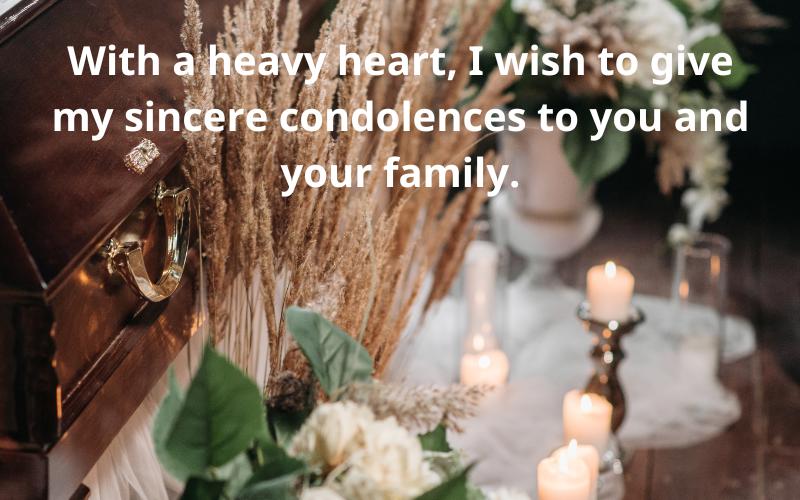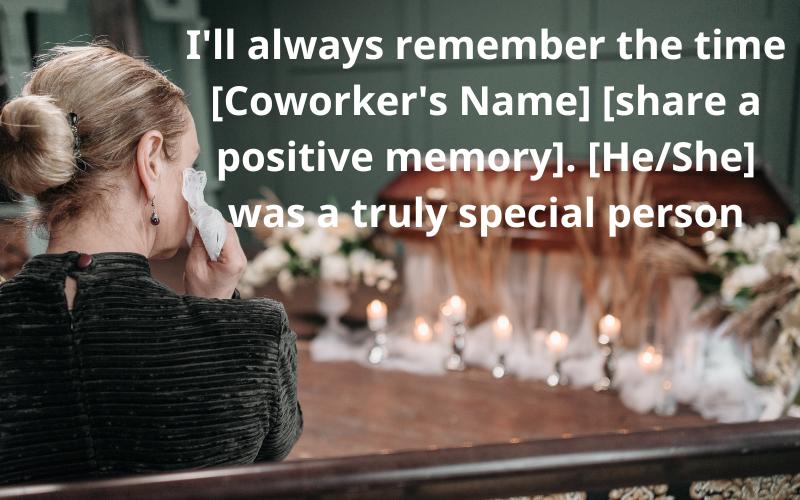-da0801079a650a2e.jpeg)
100+ Condolence Messages to Coworker: Short, Email & Card Examples (2026)
When a colleague faces loss, finding the right words to express sympathy can feel overwhelming. These thoughtful messages provide comfort while maintaining professional boundaries.

Blog Post Contents
When a colleague faces a loss, finding the right words can feel overwhelming. You want to express sympathy without crossing professional boundaries or sounding insincere.
Whether you need a quick message for Slack, a formal subject line for an email, or a heartfelt note for a physical card, this guide provides respectful examples for every workplace situation.
Jump to what you need:
- Short Condolence Messages (Text & Slack)=
- Professional Email Templates & Subject Lines
- How to Structure a Sympathy Card
- Condolence Messages for Loss of Parent
- Condolence Messages for Loss of Spouse/Partner
- Messages for Extended Family Loss
- Inspirational & Uplifting Sympathy Quotes
- Group Messages (From the Entire Team)
- Messages to a Coworker's Family (Memorial)
- FAQ: Etiquette & Timing
Short Condolence Messages for Coworkers (Text & Slack)
In modern workplaces, it is often appropriate to send a brief, immediate message via Slack, Microsoft Teams, or text to acknowledge the news before sending a formal card later. These messages should be concise and low-pressure.
- "I am so sorry to hear the news. Thinking of you and your family."
- "My deepest sympathies. Please take all the time you need."
- "I was heartbroken to hear about your loss. Sending you strength."
- "Thinking of you. Don't worry about work—we have everything covered here."
- "So sorry for your loss. I’m just a text away if you need anything."
- "Sending warm thoughts to you and your family during this tough time."
- "My heart goes out to you. Please let me know if I can support you in any way."
- "Deepest condolences. We are all thinking of you."
Professional Condolence Email Templates
Sending an email is often the standard for professional condolences. It allows you to be thoughtful without demanding an immediate response. One of the hardest parts is writing the subject line.
Best Subject Lines for Condolence Emails:
- Subject: So sorry for your loss
- Subject: Thinking of you
- Subject: My deepest condolences
- Subject: With sympathy - [Your Name]
- Subject: Condolences on the passing of your [Father/Mother]
Template 1: Formal & Professional
"Dear [Name],
I was deeply saddened to hear about the passing of your [relative]. Please accept my sincere condolences.
I know this is a difficult time, so please do not worry about [specific project/work task]—I will handle it in your absence.
Thinking of you and your family.
Sincerely, [Your Name]"
Template 2: Personal & Supportive (For closer colleagues)
"Hi [Name],
I am so incredibly sorry to hear about your loss. I can only imagine how difficult this time is for you.
Please take the time you need to be with your family. If you need someone to cover your shift or help with [specific task], just let me know.
Sending you strength, [Your Name]"
How to Structure a Professional Sympathy Card
Writing a physical card requires a bit more structure than a text. If you are stuck on what to write, follow this simple 4-step formula:
The Salutation: Keep it professional but warm ("Dear [Name]").
The Sympathy: Acknowledge the loss directly ("I was heartbroken to hear about the loss of your father").
The Tribute (Optional): If you knew the deceased, share a brief positive memory. If not, acknowledge your colleague's grief ("I know how close you were to him").
The Offer of Support: Keep it realistic ("Please let me know if I can help with the upcoming deadline").
The Sign-off: Choose a respectful closing.
Professional Sign-offs for Sympathy Cards:
"With deepest sympathy,"
"With heartfelt condolences,"
"Thinking of you,"
"Wishing you peace,"
"Sincerely,"
Condolence Message from a Group: Collective Support and Comfort
When signing a card on behalf of the entire department or company, use 'We' statements to show collective support.
- "When a coworker experiences a loss, a well-crafted condolence message can provide much-needed comfort and support." Condolence message from a group "helps express sharing from the group, helping to ease the sadness of colleagues."
- "On behalf of our entire team, please accept our deepest sympathies."
- "We just wanted to let you know that our thoughts are with you and your family."
- "We are wishing you and your family courage and peace during this time of mourning."
- "Our hearts go out to you during this time of sorrow."
- "We hold you close in our thoughts. We are deeply sorry for your loss."
- "Our condolences for the loss of your [mother/father/partner]. With deepest sympathy from your coworkers at [company name]."
- "Please know we are thinking of you during this painful time. As your work family, we are here for you."
- "We're so deeply sorry for your loss. We will be thinking of you."

Additional group sympathy messages include:
- "Our hearts are saddened by your loss, and our thoughts are with you."
- "We would like to express our sincere condolences to you and your family."
- "Everyone at the office is thinking of you. We hope you feel our best wishes and combined efforts in our support of you right now."
- "Sincere condolences from your work family. You are one of us, and we feel sorrow with you."
- "Sending care and condolence to you and your family-from all in your work family."
- "Please know that many of us are thinking of you at this time of sorrow. May you find strength and peace."
- "We wish you strength during this difficult time. Our thoughts are with you and your family."
- "May you have courage and peace during this time of mourning."
- "A loss like this is heartbreaking. We hope you know we are by your side during this time of sorrow."
- "Our words cannot take away the pain of loss, but we hope you find solace in knowing some people care about you. Deepest condolences."
Sympathy Message for Loss of a Parent: Honoring Life's Greatest Influence
Losing a parent is a profound life event. These messages acknowledge that unique bond while offering comfort.
- "When a coworker faces the heartrending loss of a parent, our words in" sympathy message for loss of a parent "must touch on the profound influence that parent had in their life."
- "Please accept my deepest sympathies for the loss of your [father/mother]."
- "I am sorry to hear about the loss of your [mother/father]. Wishing you comfort and peace."
- "May you have happy and meaningful memories of your [father/mother] to bring you comfort. My sympathy and best wishes at this difficult time."
- "Wishing you my sincere sympathies for the loss of your [dad/mom]. You and your family are in my thoughts and prayers."
- "May you have the strength and courage to bear the loss of your [mom/dad]. My deepest sympathies to you and your family."
- "Losing a parent is heartbreaking. You have my most heartfelt sympathies during this time."
- "I am deeply sorry to hear about the loss of your [mother/father]. Losing a parent is one of life's most profound challenges. Please know that I am here for you during this difficult time, and if there is anything I can do to help, don't hesitate to ask."
- "My heart goes out to you and your family as you grieve the loss of your [mother/father]. I can only imagine the pain you must be feeling right now. Please accept my sincere condolences and know that I am thinking of you during this trying time."
- "I was saddened to learn of your [mother's/father's] passing. [He/She] must have been an extraordinary person to have raised someone as wonderful as you. I hope that the love and memories you shared will bring you comfort in the days ahead."

Additional parental loss sympathy messages:
- "I want to express my deepest sympathies for the loss of your [mother/father]. Losing a parent is never easy, no matter our age. Please know that I am here to support you in any way I can during this time of grief."
- "I am truly sorry for your loss. Your [mother/father] will always be remembered for the love and guidance [he/she] provided. I hope you can find solace in the beautiful memories you shared and know that your work family is here to support you."
- "Extending my deepest sympathies for the loss of your [mother/father]."
- "I was deeply saddened to hear about your [mother's/father's] passing. Thinking of you and your family."
- "I am terribly sorry to hear the news about your [mother/father]. Please accept my condolences."
- "You and your whole family are in my thoughts."
- "May loving memories of your [mother/father] help you find peace."
- "Thinking of you and wishing you strength and comfort."
- "Know that my thoughts and prayers are with you and your family at this sorrowful time."
- "You have my deepest condolences for the loss of such a wonderful person."
- "Please accept these flowers in honor of [name]. May he/she/they rest in peace."
- "I would like to offer my deepest sympathy to you and your family. May the soul of your [mother/father] rest in peace."
Condolence Message for the Loss of a Spouse or Partner: Supporting Through Profound Grief
The loss of a partner is incredibly isolating. These messages aim to offer warmth and community support during a devastating time.
- "Condolence message for the loss of a spouse or partner is a seismic shift in a coworker's life, an intimate sorrow that demands our deepest empathy. Our collective sympathy message seeks to honor the unique bond they shared and acknowledges the profound void left behind."
- "Words just can't say enough, but I hope these flowers bring you comfort during this time of sadness."
- "Sending my deepest sympathy and caring wishes to you and your family."
- "Thinking of you, remembering [spouse or partner's name] and celebrating his/her/their life."
- "Wishing you courage to face the days ahead and loving memories to hold in your heart forever."
- "My heart sincerely goes out to you. Please accept my deepest sympathy."
- "I'm sorry to learn of the passing of your dear [husband/wife/partner]. He/she/they will be fondly remembered."
- "Today and always, may loving memories bring you strength and comfort."
- "With a heavy heart, I wish to give my sincere condolences to you and your family."

Additional spousal loss condolence messages:
- "Keeping you and [name] in my thoughts and prayers. My deepest sympathy."
- "May the memories of [name] help you find peace and comfort."
- "My heart goes out to you as you grieve the loss of your [husband/wife/partner]. [He/She] was an amazing person who touched so many lives, and [his/her] legacy will live on through the love and memories you shared."
- "I am truly sorry for the loss of your beloved [husband/wife/partner]. The love you shared was an inspiration to all who knew you, and I know that [his/her] presence will be deeply missed."
- "Words fall short of expressing my sorrow for your loss. Your [husband/wife/partner] was an extraordinary person who brought so much love and happiness to your life."
- "I am heartbroken to learn of the passing of your [husband/wife/partner]. [He/She] was a remarkable person who touched countless lives, and [his/her] love for you was always evident."
- "Please accept my deepest sympathies on the loss of your beloved [husband/wife/partner]. The love you shared was truly special, and I know that [his/her] memory will forever be a source of comfort and strength for you."
- "I am heartbroken to hear about the loss of your beloved [husband/wife/partner]. [His/Her] love and devotion to you were always evident, and I can only imagine the depth of your grief."
- "Words cannot express how sorry I am for your loss. Your [husband/wife/partner] was an extraordinary person who touched so many lives, and [his/her] absence will be deeply felt."
- "My heart breaks for you as you mourn the loss of your [husband/wife/partner]. The love you shared was truly special, and I know that [his/her] memory will forever live in your heart."
- "I extend my deepest condolences on the passing of your [husband/wife/partner]. [He/She] was an incredible person who brought so much joy and love to your life."
- "I am deeply saddened to learn of the loss of your beloved [husband/wife/partner]."
Condolence Message for Loss of an Extended Family Member: Acknowledging Important Connections
Condolence message to coworker for extended family losses requires understanding that siblings, grandparents, aunts, uncles, and other family members often play crucial roles in our colleagues' lives. These relationships frequently provide emotional support, childhood memories, and ongoing connection that makes their loss particularly meaningful.
Extended family loss can trigger complex grief because these relationships often represent connection to family history, cultural traditions, and shared experiences that helped shape your colleague's identity. Your condolence message to coworker should acknowledge the special role this person played while offering comfort and practical support.
Through my experience helping teams support colleagues through various family losses, I've learned that condolence message to coworker examples for extended family work best when they acknowledge the irreplaceable role this person played while offering specific, tangible support like meals or assistance with errands.
- "In condolence message for loss of an extended family member, we strive to acknowledge the irreplaceable role this person played in their life, weaving in shared memories when fitting, and offering tangible support such as meals or help with errands during these trying times."
- "I am deeply sorry to hear about the passing of your loved one."
- "My deepest sympathy goes out to you at this difficult time."
- "May happy memories of your [family member] comfort you during this sad time."
- "I'm sorry to hear about your loss. Even though I never met your [family member], I know how much she/he/they meant to you."
- "Thinking of you in these difficult times."
- "I wish you and your family peace and comfort as you grieve the loss of your [family member]."
- "I know what a close bond you and your [family member] had. Please accept my condolences."
- "May you find comfort in the outpouring of love surrounding you and your family."
- "My deepest condolences on the loss of your [family member]. I know that it was unexpected. You and your family will be in my thoughts and prayers."
- "I'm thinking of you during this tough time. I'm so sorry for your loss."

Additional extended family sympathy messages:
- "I am deeply saddened to hear about the loss of your [family member]. Losing someone so close to your heart is an unimaginable pain."
- "My heart goes out to you and your family as you grieve the loss of your beloved [family member]. [He/She] will always be remembered for the love and joy [he/she] brought to your lives."
- "I want to express my heartfelt sympathies on the passing of your [family member]. [His/Her] presence in your life was truly a blessing, and [his/her] memory will forever live on in the hearts of those who loved [him/her]."
- "I am truly sorry for the loss of your [family member]. [He/She] was an extraordinary person who touched so many lives, and [his/her] absence will be deeply felt."
- "Words cannot express the sorrow I feel for your loss. Your [family member] was an amazing person who brought so much love and happiness to your life."
Simple Condolences Messages for Coworkers: When Less is More
Condolence message to coworker doesn't always require lengthy expressions—sometimes simple, heartfelt words provide the most comfort. These brief messages work particularly well when you don't know your colleague intimately but want to acknowledge their loss and offer support.
Simple condolence message to coworker examples prove that authentic sympathy doesn't require elaborate language. Often, straightforward expressions of care and availability provide exactly what grieving colleagues need—acknowledgment of their pain and assurance that support is available when needed.
From my years of workplace communication experience, I've observed that brief condolence message to coworker messages often resonate deeply because they're easy to read during overwhelming times and demonstrate genuine care without feeling overwhelming or demanding emotional response from the grieving person.
- "Sometimes, you may not have enough words to express sympathy for coworker who lost their loved ones. Keep it simple and concise but still show that you care and understand with" simple condolences messages for coworkers.
- "With heartfelt condolences."
- "Sending caring thoughts your way."
- "I was so saddened to hear of your loss."
- "So sorry for your loss."
- "Thinking of you."
- "Sent with love and remembrance of your loved one."
- "With deepest condolences to the [name] family."
- "Celebrating the life of a great person."
- "Someone so special can never be forgotten."
- "With deepest sympathy as we remember [name]."
- "If you need to talk or need anything at all, I'm here."
- "May you find comfort in the memories you shared."
- "I can't imagine what you're going through, but I'm here for you."

Additional simple sympathy messages:
- "It's okay to take all the time you need to grieve."
- "Remember to be kind to yourself during this tough time."
- "I'm here to support you in any way I can."
- "Please know that you're not alone in your grief."
- "I'm here to listen if you need to talk or share memories."
- "May you find moments of peace amidst the pain."
- "Please take care of yourself as you navigate through grief."
- "I'm here to help with anything you need, even if it's just a listening ear."
- "I'm here to help lighten your burden in any way I can."
- "Please don't hesitate to reach out if you need anything at all."
Inspirational Sympathy Message for Coworkers: Finding Hope in Memory
Condolence message to coworker can provide inspiration while acknowledging loss by celebrating the positive impact the deceased had on those around them. These messages help frame grief within a context of gratitude and ongoing influence rather than focusing solely on absence and pain.
Inspirational condolence message to coworker examples work particularly well for colleagues who appreciate positive perspectives and find comfort in focusing on legacy, continued influence, and the ways their loved one's memory can provide ongoing guidance and motivation.
Through my experience helping workplace teams process loss, I've found that inspirational condolence message to coworker messages often provide the most long-term comfort because they help reframe grief as celebration of love and influence rather than simply focusing on loss and absence.
- "Our inspirational sympathy message for coworkers seeks to honor and cherish their memory, reflecting on the specific qualities that made them invaluable to our team. Together, we share this sense of loss and offer each other unwavering support during this time."
- "We were deeply saddened to hear of [Coworker's Name]'s passing. May their memory inspire us to face each day with the same [positive quality] spirit they brought to work."
- "Sending heartfelt condolences to you and your family. Though [Coworker's Name] is gone, the impact they made on our lives and our work will continue to inspire us."
- "The world lost a wonderful person in [Coworker's Name]. Let's honor their memory by carrying on their legacy of [positive quality] and [positive quality] in all we do."
- "Words seem inadequate, but [Coworker's Name]'s strength and resilience will forever be an inspiration to us. May their memory bring you comfort during this difficult time."
- "While grief may cloud your days now, [Coworker's Name]'s positive spirit will shine on in our hearts."
- "We celebrate the life of [Coworker's Name] and the incredible impact they had on our team. Their legacy of [positive quality] work and [positive quality] spirit will continue to motivate us."
- "[Coworker's Name] may be gone, but the joy and laughter they brought to the office will never be forgotten. Let's keep their spirit alive by cherishing every moment."
- "Though our hearts ache, we find solace in the wonderful memories of [Coworker's Name]. May their life serve as an inspiration to live each day to the fullest."

Additional inspirational condolence messages:
- "[Coworker's Name] was a true gem, leaving an imprint on our hearts and our work. Let's carry their torch of [positive quality] and [positive quality] forward."
- "Sending heartfelt condolences for a life well-lived. [Coworker's Name] will be remembered for their [positive quality] approach to life and work. We were all blessed to know them."
- "While we mourn the loss of [Coworker's Name], their passion for [work-related passion] will continue to inspire our future endeavors. Sending you strength during this difficult time."
- "Though saddened by the passing of [Coworker's Name], we find solace in knowing their spirit lives on through the values they instilled in us. May their memory guide us as we move forward."
- "The light of [Coworker's Name] may have dimmed, but the lessons they taught us will forever illuminate our path. We are here for you, and together, we will honor their memory."
- "[Coworker's Name] may no longer be here physically, but the impact they made on our team will continue to shape our future. Sending you peace and strength."
- "As we grieve the loss of [Coworker's Name], we find hope in the memories they leave behind. We will continue to carry their legacy forward in our work and lives."
- "Though grief may feel overwhelming, remember that you have the inner strength to weather even the toughest storms. Your courage and determination inspire us all."
- "In honoring the memory of your [family member], we are reminded of the power of love and the enduring impact one life can have. May their legacy continue to inspire and guide you."
- "Your ability to find light in the darkness and hope in the face of adversity is a true testament to your character. You inspire us all with your unwavering spirit."
- "As you navigate this challenging chapter, remember that you have the strength and resilience to emerge even stronger. Your courage and grace serve as an inspiration to your work family."
- "May the love and memories you shared with your [family member] serve as a constant source of comfort and inspiration. You are a shining example of strength and resilience to all who know you."
Sympathy Message for Coworker Who Passed Away: Honoring Workplace Relationships
Condolence message to coworker families when a colleague has died requires special consideration because these messages address people outside your workplace while acknowledging the professional relationship and impact your deceased colleague had on the work environment and team dynamics.
When writing condolence message to coworker families, focus on the positive qualities and professional contributions your deceased colleague made while offering support to surviving family members who may not know you personally but appreciate hearing about their loved one's workplace relationships and impact.
Through my experience helping teams process the death of colleagues, I've learned that condolence message to coworker families work best when they share specific positive memories or professional qualities while offering continued support and acknowledging the loss felt by the entire workplace community.
- "Our inspirational sympathy message for coworkers seeks to honor and cherish their memory, reflecting on the specific qualities that made them invaluable to our team. Together, we share this sense of loss and offer each other unwavering support during this time."
- "I was so saddened to hear about the passing of [Coworker's Name]. My thoughts are with you and your family during this difficult time."
- "We were all heartbroken to learn of [Coworker's Name]'s passing. [He/She] was a valued member of our team, and we will miss [him/her] greatly."
- "Sending my heartfelt sympathy to you and your family for the loss of [Coworker's Name]. May their memory be a blessing."
- "[Coworker's Name]'s presence will be deeply missed. Please know that we are all here for you if you need anything at all."
- "[Coworker's Name] was such a [positive quality] and [positive quality] person. The office won't be the same without [him/her]."
- "I'll always remember [Coworker's Name]'s [positive quality] nature and willingness to help. [He/She] truly made a difference."
- "[Coworker's Name] was a bright light in our office. [He/She] will be remembered for [his/her] [positive quality] spirit and [positive quality] work ethic."
- "We will miss [Coworker's Name]'s [positive quality] sense of humor and [positive quality] approach to problems."
- "[Coworker's Name] was a true team player, always there to lend a hand. [He/She] will be deeply missed by all who knew [him/her]."
- "I'll always remember the time [Coworker's Name] [share a positive memory]. [He/She] was a truly special person."

Additional colleague memorial messages:
- "[Coworker's Name] always knew how to brighten the day. I'll miss [his/her] [positive quality] personality and the fun we had working together."
- "[Share a specific memory of a contribution they made] [Coworker's Name] will be remembered for [his/her] dedication and positive impact on our work."
- "Working with [Coworker's Name] was a pleasure. [He/She] was always [positive quality] and made a lasting impression on me."
- "[Coworker's Name] will be deeply missed, but the memories we shared will always remain."
- "Please know that we are all thinking of you during this difficult time. If there's anything we can do to help, please don't hesitate to ask."
- "My thoughts and prayers are with you and your family. Don't be afraid to reach out if you need someone to talk to."
- "We are here for you, [grieving coworker's name]. Whether you need a listening ear or a helping hand, please don't hesitate to reach out."
- "The loss of a coworker is never easy. Please know that you are not alone in this. We are here to support you in any way we can."
- "Our team is here for you during this difficult time. Sending you strength and comfort."
Conclusion: Building Compassionate Workplace Communities Through Thoughtful Communication
Condolence message to coworker represents more than professional courtesy—it demonstrates organizational values, builds stronger team relationships, and provides crucial support during life's most difficult moments. These thoughtful communications help create workplace cultures where employees feel valued as complete human beings rather than just productive resources.
The journey through grief is deeply personal, yet condolence message to coworker reminds us that no one should face loss alone. These expressions of sympathy connect us to our shared humanity while providing practical support that can make significant differences in how colleagues cope with devastating losses.
As you navigate the delicate balance of supporting grieving coworkers while maintaining professional boundaries, remember that condolence message to coworker effectiveness depends more on genuine caring than perfect wording. Authentic expressions of sympathy and practical offers of support often provide the most meaningful comfort.
The 100+ condolence message to coworker examples in this guide address various relationships, loss types, and workplace situations to help you find appropriate words when your own feel inadequate. Use these messages as starting points while personalizing them to reflect your specific relationship and workplace culture.
Most importantly, remember that condolence message to coworker communications represent opportunities to strengthen workplace communities, demonstrate shared values, and provide support that extends far beyond professional responsibilities. These moments of vulnerability often become foundations for deeper trust, stronger collaboration, and more meaningful work relationships.
Whether you're writing on behalf of your entire team, expressing individual sympathy, or supporting a colleague through the death of a coworker, condolence message to coworker serves as a bridge between professional and personal care that makes workplaces more human and supportive for everyone.
Take time to craft messages that feel authentic to your relationship and workplace culture. Allow these expressions to demonstrate your organization's commitment to supporting employees through all of life's seasons, creating environments where people can bring their whole selves to work while knowing they'll be supported during their most vulnerable moments.
For additional support during difficult times, explore our collection of loss of a brother quotes to find comfort and healing words for various types of family loss.
-d4c38c342cdf20ca.jpeg)


-b555fcc6b204c456.jpeg)



